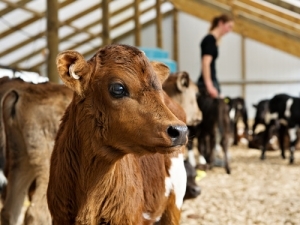Meat Industry Association CEO to Step Down
The Meat Industry Association of New Zealand (MIA) today announced that Chief Executive Officer Sirma Karapeeva has resigned from the role.
 While the wider group is co-ordinating a range of activities, each organisation is developing its own initiatives relevant to their part of the supply chain.
While the wider group is co-ordinating a range of activities, each organisation is developing its own initiatives relevant to their part of the supply chain.
The eight organisations that formed a Bobby Calf Action Group at the end of 2015 are well advanced on a range of initiatives ensuring best practice handling and management of bobby calves.
The group compromises DairyNZ, Dairy Companies Association of New Zealand, Meat Industry Association, Federated Farmers, New Zealand Petfood Manufacturers Association, Road Transport Forum, New Zealand Veterinary Association and the Ministry for Primary Industries.
Scott Gallacher, MPI deputy director general regulation and assurance, says a number of the initiatives being worked on were new, other initiatives were already underway but were being accelerated.
"There has been a significant body of work underway for some time on bobby calves through a range of industry and government activities and groups," Gallacher said.
"What the Action Group is about is ensuring leadership and co-ordination in order to make sure best practice in bobby calf management is developed and implemented, and that the public can be confident that everybody involved with bobby calves takes the right level of care.
"We saw some appalling video last year and while that was not representative of the industry as a whole, all the groups involved are committed to stamping out bad practice and implementing best practice."
While the wider group is co-ordinating a range of activities, each organisation is developing its own initiatives relevant to their part of the supply chain.
Activities underway include:
• DairyNZ has worked with dairy companies to make sure autumn calving farmers are aware of good practice and have access to guidelines on the welfare of bobby calves and humane slaughter
• In association with veterinarians, DairyNZ also has a Welfare Matters – Calf Care workshop on bobby calf supply chain awareness, responsibilities and good practice advice under development for roll-out in May and June. It is also developing a CalvingSmart programme of training for junior staff and farm managers. DairyNZ is also working with farmers and trucking operators to develop and agree practical advice and guidelines on how to ensure calves are fit for transport and loading
• The Ministry for Primary Industries is developing proposals for new regulations on the care and handling of bobby calves. The proposals have been discussed at two workshops with industry and animal welfare interest groups and are likely to be available for public consultation in April 2016
• In 2016 MPI will visit 1200 farms as part of its On-Farm Verification programme to familiarise farmers with their legal responsibilities
• MPI has invested $250,000 on a comprehensive, scientific assessment of bobby calf welfare to help understand the state of bobby calf welfare, examine data over two seasons, including the upcoming 2016 season, to help provide evidence based decisions about bobby calf management
• The Road Transport Forum is developing and updating its guidelines for bobby calf handling and transport
• The Meat Industry Association is working with processors to ensure that responsibilities regarding animal welfare are clearly understood across the value chain, and
• The Petfood Manufacturers Association is reviewing its code of practice.
In addition, MPI has initiated an animal welfare awareness campaign which encourages everyone who sees mis-treatment of stock to report it to the MPI hotline – 0800 00 83 33.
The Meat Industry Association of New Zealand (MIA) today announced that Chief Executive Officer Sirma Karapeeva has resigned from the role.
The winners of the 2026 Hawke’s Bay/Wairarapa Dairy Industry Awards were announced at the annual awards dinner held at Copthorne Solway Park in Masterton on Thursday evening.
Environment Southland is welcoming this week’s decision by the Environmental Protection Authority (EPA) to approve the release of Blaptea elguetai, a leaf‑feeding beetle that will help control the highly invasive Chilean flame creeper.
This March, the potato industry is proudly celebrating International Women’s Day on 8 March alongside the International Year of the Woman Farmer, recognising the vital role women play across every part of the sector — from paddocks and packhouses to research, leadership, and innovation.
Fruit trader Seeka posted a record profit and returns to shareholders in 2025.
Recent weather events in the Bay of Plenty, Gisborne/Tairawhiti, and Canterbury have been declared a medium-scale adverse event.
OPINION: Staying with politics, with less than nine months to go before the general elections, there’s confusion in the Labour…
OPINION: Winston Peters' tirade against the free trade deal stitched with India may not be all political posturing by the…